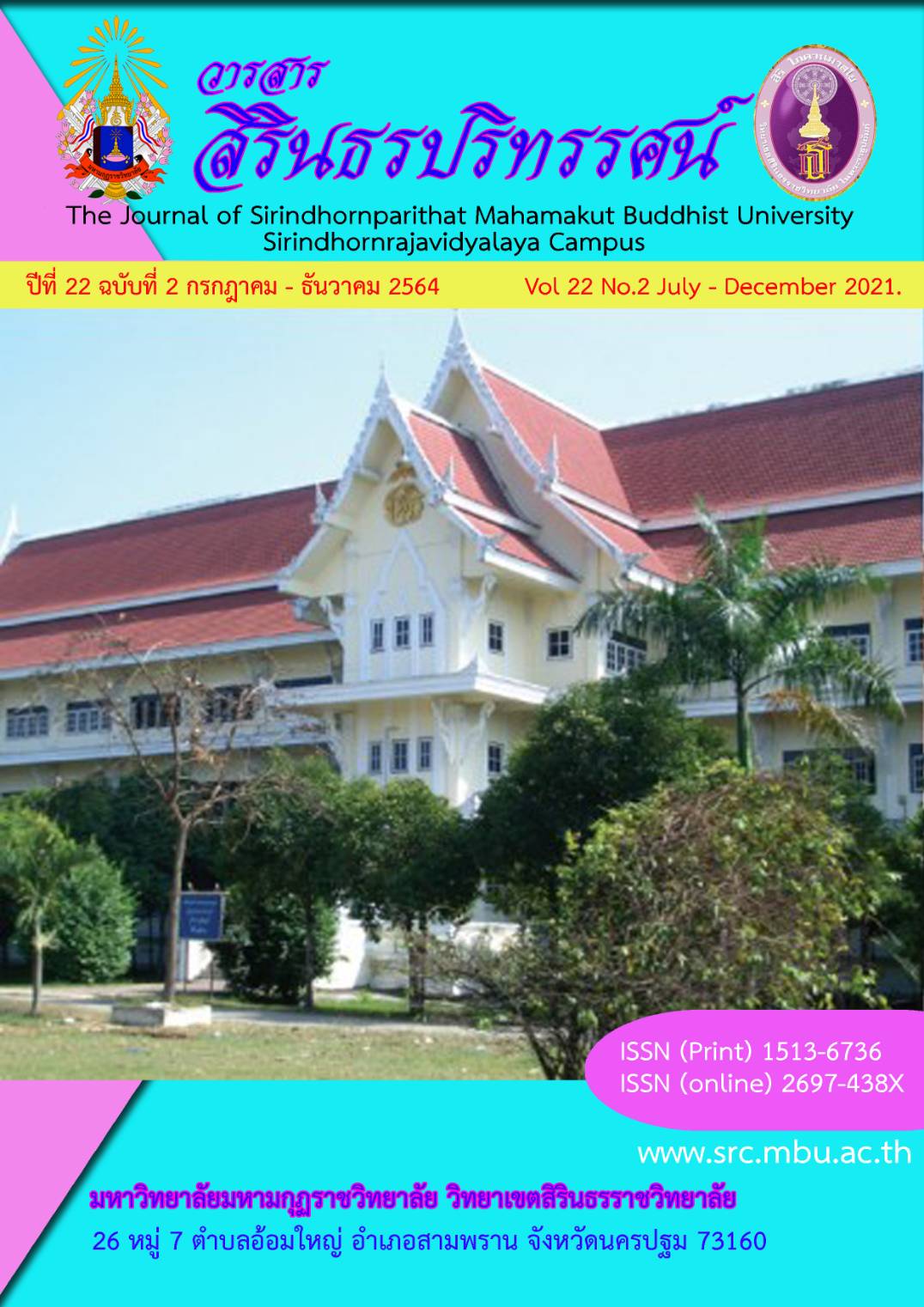POTENTIAL DEVELOPMENT OF CAREGIVERS FOR BEDSIDE PATIENTS ATYAICHA COMMUNITY SAMPHRAN DISTRICT NAKHON PATHOM PROVINCE
Keywords:
Youth development process, volunteer spiritAbstract
The objectives of this research are 1. To study the role of bed-seated caregivers This research was a Participatory Action Research-PAR, by collecting data from in-depth interviews and individual group discussions from 15 key informants and using the triangulation.
The research found that;
- The study of the role of caregiver of bed-bound patients most bed-bound caregivers are relatives who may not have knowledge and understanding. Guidelines for solving problems should provide basic knowledge for them who look after for bed-bound patients. Thus, caregivers have the correct and appropriate knowledge of substances to take care of the addicted patient in bed. These bed-bound patients need supervision all times and in all respects, physical, nutrition or mental.
- Potential development of caregivers of bed-bound patients according to Buddhist principles, the caregiver is closely caring for bed-bound patients, requiring professional knowledge. Moreover, develop oneself and be trained are the qualities that caregivers must have. In addition, it must be trained, trained by a standardized agency that supports the work and they are regularly trained for update knowledge whether it be in the field of Physical care Rehabilitation therapy for bed-bound patients, wound dressing, nutritional hygiene, proper dietary care for bed-bound patients and encouraging the bed-bound patient.
- Building a network to promote nursing care workers there must be a government or private organization to participate in educating. To develop abilities, including ensuring the work of caregivers for patients to the same standard. Moreover, it can be used in this profession with quality. Caregivers should receive knowledge or training from an institution with a standard that is acceptable to public and an accredited training unit. There will be a job or the place to accommodate the caregiver work after graduation from training institution.
References
การพัฒนานโยบายการดูแลผู้ป่วยสูงอายุติดเตียงของภาครัฐและชุมชน : กรณีศึกษา การดูแลผู้ป่วยสูงอายุติดเตียงของผู้ดูแลในตำบลงิ้วราย อำเภอนครชัยศรี จังหวัดนครปฐม. มหาวิทยาลัยราชภัฏวไลยอลงกรณ์.
“แผนพัฒนาท้องถิ่น (พ.ศ.2561–2565) ฉบับแก้ไข เปลี่ยนแปลงเพิ่มเติม ครั้งที่ 1/2563”, องค์การบริหารส่วนตำบลยายชา อำเภอสามพราน จังหวัดนครปฐม, (กุมภาพันธ์ 2563), 3.
ฑิตยา สุวรรณะชฎ. (2527). สังคมวิทยา. กรุงเทพฯ : ไทยวัฒนาพานิช.
ยุวัฒน์ วุฒิเมธี. (2559). ธรรมาภิบาลในลางานของมหาวิทยาลัยราชภัฏราชนครินทร์. วารสารมนุษยศาสตร์และสังคมศาสตร์, ม. ธนบุรี ฉบับ. 10 ฉบับที่ 23.
ดิเรก ฤกษ์หร่าย. (2527). การพัฒนาชนบท. กรุงเทพฯ : โครงการตำราพัฒนาชนบท สำนักส่งเสริมและฝึกอบรม มหาวิทยาลัยเกษตรศาสตร์.
วิทยากร เชียงกูล. (252). การพัฒนาเศรษฐกิจสังคมไทย บทวิเคราะห์. กรุงเทพฯ : ฉับแกระ.
ปาริชาติ วลัยเสถียร. (2541). “ทฤษฎีและหลักการพัฒนาชุมชน”, ในเอกสารประกอบการศึกษาวิชา สค. 651 ทฤษฎีและหลักการพัฒนาชุมชน. กรุงเทพฯ : คณะสังคมสงเคราะห์ศาสตร์ มหาวิทยาลัยธรรมศาสตร์.
พวงเพ็ญ เผือกสวัสดิ์ และคณะ. (2559). “สถานการณ์ ปัญหา และความต้องการการดูแลผู้ป่วยเรื้อรังกลุ่มติดบ้านติดเตียงในชุมชนเขตเทศบาลนคร สุราษฎร์ธานี”. งานวิจัยสำนักงานสาธารณสุขและสิ่งแวดล้อม เทศบาลนครสุราษฎร์ธานี.
พิสมัย บุญเลิศ และคณะ. (2559). “การพัฒนารูปแบบการดูแลสุขภาพอย่างต่อเนื่อง สำหรับผู้สูงอายุกลุ่มติดบ้าน ติดเตียงในโรงพยาบาลส่งเสริมสุขภาพตำบลบ้านดงมันตำบลสิงห์โคก อำเภอเกษตรวิสัย จังหวัดร้อยเอ็ด”. รายงานการวิจัย, คณะสาธารณสุขศาสตร์ มหาวิทยาลัยมหาสารคาม.
Downloads
Published
Issue
Section
License
Copyright (c) 2022 Mahamakut Buddhist University

This work is licensed under a Creative Commons Attribution-NonCommercial-NoDerivatives 4.0 International License.
บทความที่ได้รับการตีพิมพ์เป็นลิขสิทธิ์ของ มหาวิทยาลัยมหามกุฏราชวิทยาลัย วิทยาเขตสิรินธรราชวิทยาลัย
ข้อความที่ปรากฏในบทความแต่ละเรื่องในวารสารวิชาการเล่มนี้เป็นความคิดเห็นส่วนตัวของผู้เขียนแต่ละท่านไม่เกี่ยวข้องกับหาวิทยาลัยมหามกุฏราชวิทยาลัย วิทยาเขตสิรินธรราชวิทยาลัย และคณาจารย์ท่านอื่นๆในมหาวิทยาลัยฯ แต่อย่างใด ความรับผิดชอบองค์ประกอบทั้งหมดของบทความแต่ละเรื่องเป็นของผู้เขียนแต่ละท่าน หากมีความผิดพลาดใดๆ ผู้เขียนแต่ละท่านจะรับผิดชอบบทความของตนเองแต่ผู้เดียว




